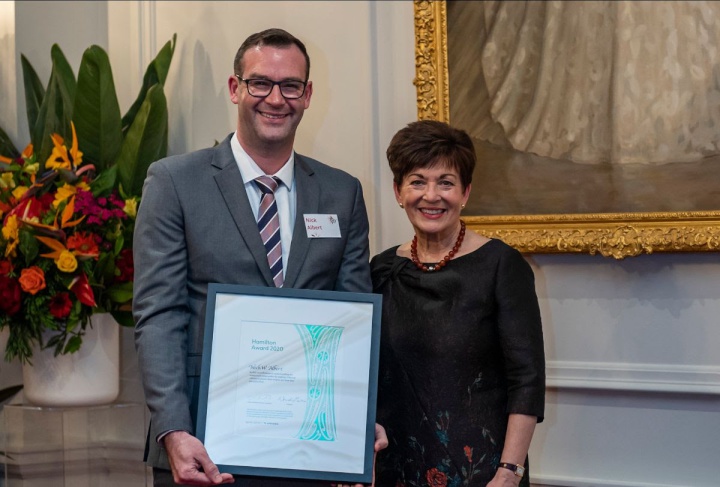Dr Nick Albert wins Royal Society Te Apārangi Hamilton Award
Emerging plant geneticist Dr Nick Albert wins Royal
Society Te Apārangi Hamilton Award

Plant & Food Research scientist Dr Nick Albert has received the Hamilton Award, the Royal Society Te Apārangi Early Career Research Excellence Award for Science. The award celebrates his contributions to the future development of new fruit varieties with novel colours and enhanced nutrition, as well as when/how during evolution the earliest land plants acquired their “sunscreen” properties to cope with environmental stress factors such as UV-B.
“It’s an honour to have my research recognised with such a prestigious award” says Dr Albert, a scientist in the Premium Crops & Technology Group. “I’ve always loved plants and am fascinated by how colour patterns form in flowers. I’ve been fortunate to combine this with my research interests in gene expression, and apply this to understanding how genes colour our fruits and vegetables.”
Dr Albert started as a summer student at Crop & Food Research (the predecessor of Plant & Food Research) in 2003 and showed great promise in plant biology before progressing to postgraduate study with Plant & Food Research and Massey University. His work focuses on identifying genes responsible for regulating where and when plants produce phytochemicals as well as the amount they make. Dr Albert currently leads research investigating why anthocyanins, pigments associated with health benefits, are usually limited to fruit skin, within a research programme which aims at developing novel berryfruit with enhanced anthocyanin content.
In 2014, he published a highly impactful paper that described the mechanism of genes in petunia that inhibit the production of anthocyanins and how they interact with all the other colour genes. This discovery was significant to horticulturalists and agriculturalists because the models have since been confirmed in multiple species and crops grown for human and animal consumption. These genes are now important targets for marker development in plant breeding programmes.
Dr Albert has recently completed a Marsden-funded research project that challenges when anthocyanin pigments evolved in plants. It has shown that flavonoid biosynthesis for UV-B protection is an ancient trait that arose early during land-plant evolution, helping plants to transition from aquatic environments to life on land. The project also discovered a new class of red pigments in liverworts, one of the closest living relatives to the first land plants. It was previously believed that the red pigments in liverworts were anthocyanins, but the research identified auronidins as the flavonoids that actually colour liverworts. The auronidins have novel properties that may contribute to the ability of liverworts to survive climatic stress, and contribute to their ability to live in extreme environments.


 Raise Communications: NZ Careers Expo Kicks Off National Tour Amid Record Unemployment
Raise Communications: NZ Careers Expo Kicks Off National Tour Amid Record Unemployment Hugh Grant: How To Build Confidence In The Data You Collect
Hugh Grant: How To Build Confidence In The Data You Collect Tourism Industry Aotearoa: TRENZ 2026 Set To Rediscover Auckland As It Farewells Rotorua - The Birthplace Of Tourism
Tourism Industry Aotearoa: TRENZ 2026 Set To Rediscover Auckland As It Farewells Rotorua - The Birthplace Of Tourism NIWA: Students Representing New Zealand At The ‘Olympics Of Science Fairs’ Forging Pathway For International Recognition
NIWA: Students Representing New Zealand At The ‘Olympics Of Science Fairs’ Forging Pathway For International Recognition Coalition to End Big Dairy: Activists Protest NZ National Dairy Industry Awards Again
Coalition to End Big Dairy: Activists Protest NZ National Dairy Industry Awards Again Infoblox: Dancing With Scammers - The Telegram Tango Investigation
Infoblox: Dancing With Scammers - The Telegram Tango Investigation